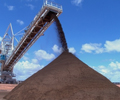

Executives at Brazilian iron ore miner Vale said July 29 they were “confident” the company will reach its 2021 iron ore production guidance as it will be aided in H2 by seasonal factors and mine capacity advances.
Still, the company is currently operating at the lower range of the 315 million mt-335 million mt guidance, executive vice president, ferrous minerals, Marcello Spinelli said during a Q2 results call with investors.
Iron ore fines production reached 75.7 million mt in Q2, which was 12% higher on the year but below analysts’ expectations as the company continues to ramp up output following curbs placed on its operations in the wake of the January 2019 Brumadinho fatal tailings dam disaster. Vale produced 385 million mt of fines in 2018, before the accident.
Capacity working rates have now reached 335 million mt/year, and the company aims to produce 1 million mt/day iron ore for the rest of the year in a recovery operation that is “really a marathon and not a sprint … and a marathon which requires discipline and persistence,” CEO Eduardo Bartolomeo said during the call.
Increasing capacity
Spinelli said capacity will be enlarged in H2 by seasonally drier weather in Q3 and the start of Q4, the fact the company has reached full capacity at its Serra Leste mine in the northern system, adding 2 million mt/year to that mine’s previous levels, and because it has a new asset, the Maravilhas III dam and conveyor at its Vargem Grande complex in southeast Brazil. That new asset will add 6 million mt/year capacity, while an increase in dry processing at the major Brucutu mine also in the southeast is adding a net 5 million mt to overall capacity.
However, these developments are offset by some delays and temporary restrictions in other areas, including a delay until 2022 in the Torto dam startup, which will add a further 12 million mt/year at Brucutu, he noted.
“In our road map to 400 million mt we have other projects online where we expect to add capacity by the end of 2022,” he said.
Reducing costs
CFO Luciano Siani said the company expects to reduce its C1 cash costs of $17.80/mt in Q2 to $16-$16.50/mt by the end of the year. Costs increased in Q2 on demurrage and inflation in service costs and maintenance, he said.
Targeted cost reductions of at least $1.50/mt include a 30 cents/mt pandemic-related cost that should soon be unwound, Siani said.
Iron ore 62% Fe fines delivered China hit an all-time high of $233/mt in May on high demand and tight supplies, contributing to Vale’s Q2 record overall EBITDA of $11.24 billion.
Source: Platts